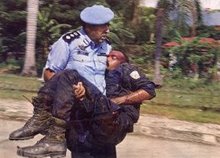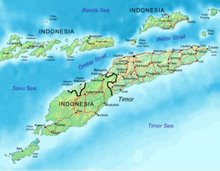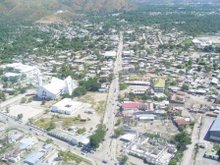
Díli, 27 Fev (Lusa) - Martinho de Almeida, fugido com o major Alfredo Reinado desde 2006, rendeu-se segunda-feira passada à polícia internacional em Timor-Leste e no dia seguinte estava de novo em liberdade, desta vez entre mais de 500 peticionários.
"Quando me entreguei, não pensava que me iam pôr aqui", afirmou hoje à agência Lusa o antigo subalterno do major Alfredo Reinado.
Martinho de Almeida entregou-se à Polícia das Nações Unidas (UNPol) em Maubisse (oeste), que também era a terra natal de Alfredo Reinado, e o comandante operacional da UNPol, Hermanprit Singh, escoltou-o pessoalmente para Díli.
A surpresa de Martinho de Almeida é que "julgava que ia ser preso". Não foi. Depois de interrogado em Caicoli, no centro de Díli, "entre as 18:00 e a meia-noite de segunda-feira", Martinho de Almeida foi transportado terça-feira para o acantonamento dos peticionários das Forças Armadas.
Depois da expulsão das Falintil-Forças de Defesa de Timor-Leste (F-FDTL) e de dois anos em fuga, num limbo negocial com o Estado timorense, os peticionários iniciaram a 07 de Fevereiro de 2008 um acantonamento em Aitarak Laran, numa zona central da capital.
Hoje de manhã, na formatura, a contagem de peticionários ia já em 557, e mais eram esperados de vários distritos.
Martinho de Almeida tem uma história diferente dessa multidão de descontentes das F-FDTL, que, em Janeiro de 2006, alegaram discriminação de base regional no seio da instituição militar.
O soldado Martinho, como os 17 co-arguidos iniciais do processo Reinado, tem uma questão penal por resolver. Os peticionários, como várias vezes lembraram os líderes timorenses, são uma questão política.
"O meu futuro só será decidido depois de resolver o caso com a justiça. Eu estou pronto para ir a tribunal e aceitar a sentença que o juiz me der", afirmou hoje o jovem soldado, 26 anos, que entrou para as F-FDTL com 21, em 2003.
Martinho de Almeida, como o seu antigo comandante, foi acusado de crimes de homicídio, rebelião contra o Estado e porte ilegal de material de guerra.
Fez parte do grupo da Polícia Militar que seguiu o major Reinado quando ele abandonou o quartel, em Abril de 2006, no início da grande crise política e militar.
Martinho de Almeida reconheceu à Lusa que participou no primeiro incidente grave entre o major Alfredo Reinado e as F-FDTL, uma emboscada em Fatuhai, a sul de Díli.
"Mas era o major que estava à frente a disparar. Eu não fiz parte, estava na retaguarda do grupo", afirmou o soldado.
"Eu saí (de Díli) com Alfredo Reinado porque ele era o meu comandante e eu sou apenas um soldado e obedeço a ordens. Hoje teria de obedecer na mesma", explicou.
Martinho de Almeida continuou com Reinado nos meses seguintes, "até à entrega das armas pesadas e dos rádios" em Ermera, em Junho, e, no final de Julho, à detenção do ex-comandante da PM em Díli, pela GNR.
O soldado Martinho esteve também com o major Reinado na fuga do Estabelecimento Prisional de Becora, onde estava em prisão preventiva, a 30 de Agosto de 2006. Esteve fugido à justiça desde essa data até segunda-feira passada.
Martinho de Almeida afirmou à Lusa que esteve com Alfredo Reinado em Same (sul) durante o cerco e o ataque por tropas australianas, em Março de 2007. "Mas depois disso desviei para Maubisse e não voltei a estar com o major Reinado", contou.
"Só voltei a vê-lo em Novembro (de 2007), na parada de Gleno", a sudoeste de Díli, onde Alfredo Reinado juntou algumas centenas de peticionários numa demonstração de força.
"Não voltei a vê-lo depois disso. Nem participei no ataque de 11 de Fevereiro" ao Presidente da República, José Ramos-Horta, e ao primeiro-ministro, Xanana Gusmão, garantiu Martinho de Almeida sob o olhar atento e desconfiado de alguns peticionários.
A entrega voluntária de Martinho de Almeida "em nada altera a sua condição de arguido", afirmou à Lusa uma fonte judicial.
O despacho da Procuradoria-geral da República que mandou entregar o arguido em Aitarak Laran "foi motivado por se considerar que não era a melhor opção neste momento enviá-lo para a prisão de Becora", segundo a mesma fonte.
Martinho de Almeida vai ser ouvido por um juiz, talvez quinta-feira.
Os elementos da UNPol que o conduziram a Aitarak Laran levavam uma ordem para o entregar ao major Tilman - um dos elementos do actual processo de acantonamento que, no entanto, não fazia parte dos 592 signatários iniciais da petição nas Forças Armadas há dois anos.
Dos 17 co-arguidos no processo Reinado, dois estão em prisão preventiva, dois morreram no ataque a José Ramos-Horta e cinco entregaram-se ou foram capturados, segundo fonte judicial.
O julgamento tem a próxima audiência para 04 de Março.
Lusa/fim







2 comentários:
Lindsay Murdoch in Darwin
February 28, 2008
AN INVESTIGATION ordered by East Timor's President, Jose Ramos-Horta, has identified a crime syndicate with links to former pro-Indonesian militiamen, which supplied drugs to youth gang members involved in violent attacks in Dili.
The investigation also found that girls as young as 12 were being trafficked into East Timor for prostitution, some of them at a brothel frequented by UN staff.
A report on the investigation criticises the Australian-led International Stabilisation Force and United Nations police in East Timor for failing to "recognise the importance and gravity of this new phenomenon" in the troubled country of 1 million people.
"The swiftness in which international drug syndicates mobilised into Timor Leste [East Timor] was underestimated by the international security forces," the report says.
But last month, within days of Mr Ramos-Horta receiving the report, Timorese and United Nations police began a series of raids on a number of premises in Dili and arrested almost 100 Timorese and foreign nationals on drugs and prostitution charges.
Mr Ramos-Horta is recovering in Royal Darwin Hospital from the serious gunshot wounds he suffered during attacks in Dili on February 11. One of his confidants headed the investigation, which was independent of both the stabilisation force and UN police.
The confidential report says Timorese and Indonesian girls aged between 12 and 15 were being brought from Indonesian West Timor and held in a number of safe houses in Dili and "only brought out on request" to a brothel operated by a drugs and human-trafficking syndicate.
The head of syndicate, an Indonesian, had established "strong and lucrative" links to martial arts gangs, the report says. The gangs have been blamed for widespread violence in Dili since April 2006.
The report identifies two shipments of methamphetamine, known as sabu sabu or ice, into Dili in December by a syndicate "controlled by Timorese-Indonesian nationals with clear ties to, and possibly funded, by ex-militia elements in West Timor".
There is no suggestion Indonesian authorities are behind any illegal activities in East Timor.
The report names a brothel in Dili that "caters to Asian commercial elites as well as NGO and UNMIT [United Nations] staff".
The UN mission in East Timor, which employs 3253 foreign and Timorese staff, enforces a strict "zero tolerance" towards sexual exploitation and abuse after outrageous behaviour by a small number of UN personnel in the past. The UN mission has a list of premises in Dili from which UN personnel are banned.
The UN Security Council this week extended the UN mission's mandate in East Timor for 12 months at a cost of $US153 million ($163 million).
British push for Balibo arrests
Julia May in London
February 28, 2008
Yunus Yosfiah … accused of being linked to deaths of the Balibo Five.
THE British Government is under pressure to order warrants for the arrests of two former Indonesian military leaders linked to the killings of the Balibo Five.
A Liberal Democrat MP, Don Foster, is urging the Government to ask Interpol to issue arrests for the Indonesians, named last year by a NSW coroner in connection with the 1975 killings of the five Australia-based newsmen in East Timor. Two of the victims, Brian Peters and Malcolm Rennie, were British. Greg Shackleton and Tony Stewart were Australian, and Gary Cunningham was a New Zealander.
The Deputy State Coroner, Dorelle Pinch, found in November that senior members of the Indonesian special forces ordered the newsmen's killings after they had surrendered to troops.
The five had filmed an Indonesian attack in the lead-up to the invasion of East Timor. Ms Pinch referred the case to the then attorney-general, Philip Ruddock, for war crimes prosecutions.
In a speech he was due to give to the British Parliament yesterday afternoon, Mr Foster urged the Commonwealth Director of Public Prosecutions to push for action over the deaths, which have been subject to claims of cover-up and inaction by the British and Australian governments.
"This debate concerns the UK role in the disgraceful cover-up on the murder of the Balibo Five … The minister must address grave concerns over the UK government's conduct," Mr Foster said. "Will the minister insist that those accused of the murders face justice by, if necessary, a UK initiative for Interpol to issue warrants for the two surviving Indonesians the coroner names?"
Two of the officers named by the coroner, Christoforus da Silva and Captain Yunus Yosfiah - who became the Indonesian information minister - are still alive. The others, the former head of the Indonesian Special Forces, Major-General Benny Murdani, and a group commander, Colonel Dading Kalbuadi, have died.
"Given the inquest's thoroughness, the [Australian] DPP has strong grounds to decide that the surviving Indonesian nationals have a case to answer," Mr Foster said.
After Ms Pinch's ruling in November, the then opposition leader, Kevin Rudd, said a Labor government would pursue war crimes prosecutions. "I believe this has to be taken through to its logical conclusion. I also believe that those responsible should be held to account," he said.
Mr Foster, the Liberal Democrats' shadow secretary for culture, media and sport, alleges the British government put up a "smokescreen" to prevent an inquest into the deaths, fearing revelations about what it knew prior to the Indonesian invasion - and information about the men's deaths. He is also calling for the Government to endorse the coroner's report.
Malcolm Rennie's cousin, Margaret Wilson, said in London: "If Australia proceeds [with prosecutions] I don't see why Britain couldn't, because two of them were British. I would like to see some sort of resolution to this in my lifetime."
Jonathan Pearlman reports: Australian police are still considering whether to bring charges against Indonesian military personnel involved in the deaths of the Balibo Five.
The case is being assessed by the Australian Federal Police, which is understood to be concerned about whether Australian laws apply to the Indonesian military, as well as diplomatic sensitivities.
"The AFP has received a referral through the Attorney-General following the NSW coronial inquest into the death of Brian Peters," an police spokesman said yesterday. "The AFP is currently assessing this referral."
The federal police have yet to produce a brief of evidence for the DPP, which could potentially press charges.
"The DPP will consider any brief of evidence referred by the AFP in accordance with the prosecution policy of the commonwealth," said a spokeswoman for the DPP.
slpng
Enviar um comentário